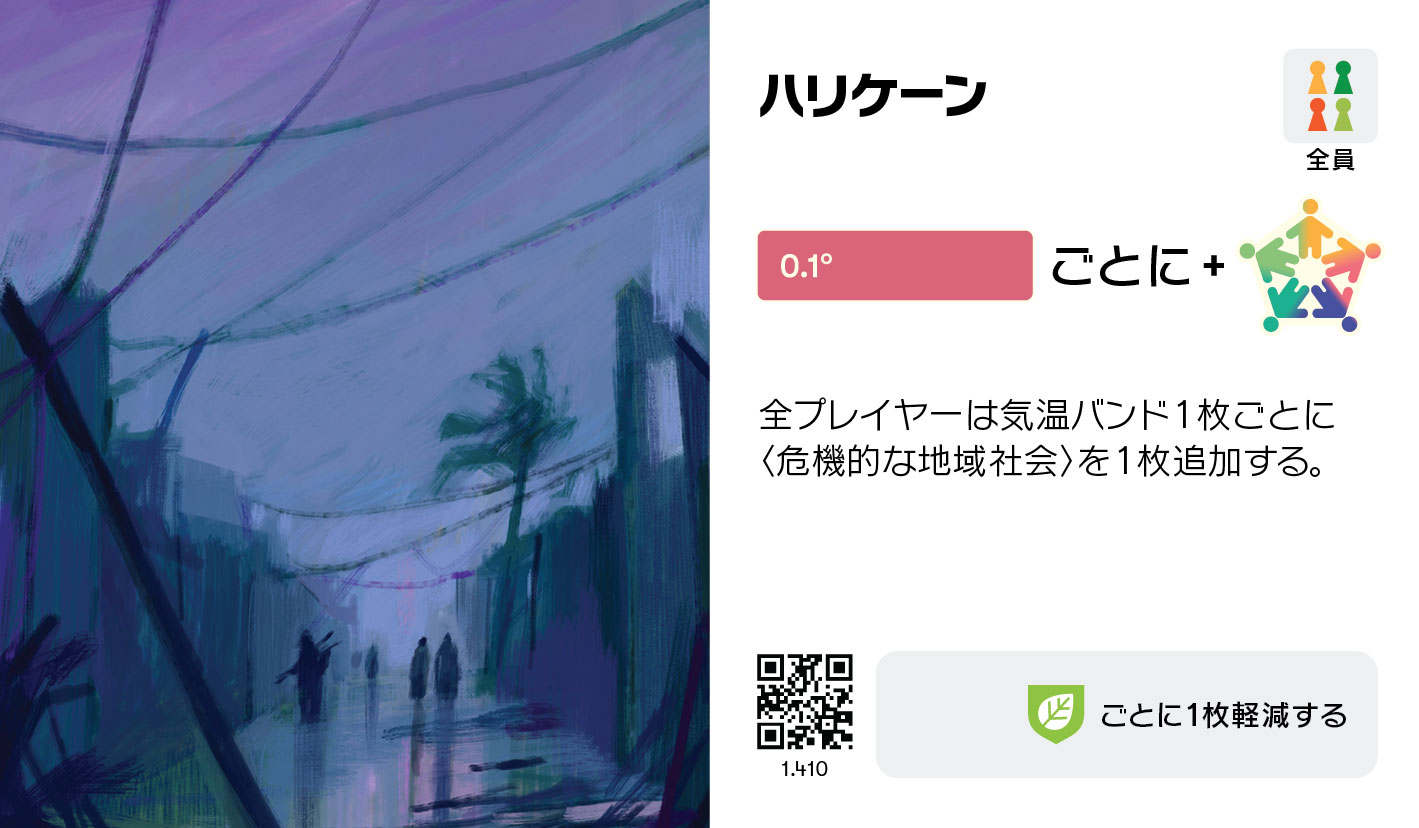ハリケーン
危機カード
ハリケーンは激しく回転する嵐で、大雨と強風(時速120km以上)を伴います。暖かい海水上で発生し、陸地に到達すると広範囲に被害をもたらします。南太平洋とインド洋周辺ではサイクロン、西太平洋ではタイフーンと呼ばれます。
北半球のハリケーンシーズンは6月~11月で、9月にピークを迎えます。南半球では、シーズンは11月に始まって4月まで続きます。
ハリケーンは内陸部に進むにつれてその強さが弱まるため、沿岸地域で特に破壊的な被害をもたらします。ハリケーンが襲来すると、重要なサービス(電力、水道、廃棄物回収など)の停止、緊急医療サービスの中断、失業したが賃金保護を受けていない従業員の賃金損失など、連鎖的な影響が生じる可能性があります。また、洪水の水が他の汚染物質と混ざると、人間の健康に危険な環境影響を引き起こすこともあります。
ハリケーンが襲来したときに最も危険にさらされるのは、避難所や、激しい嵐に耐えられるように建てられていない質の悪い家に住んでいたり、家がなかったり、洪水の起こりやすい地域に住んでいる人々です。社会的に疎外された人々、障害を持つ人々、財産の少ない人々は、災害前と災害後のサービスへのアクセスがより困難になるかもしれず、政府の避難命令に対する信頼が低下する可能性があります。
ハリケーンは暖かい海水からエネルギーと強さを得ます。気候緊急事態により海水温が上昇するにつれ、ハリケーンの強さも増しています。ハリケーンが激化する速度も以前より速くなっています。ハリケーンがより頻繁に発生するようになるかどうかは不明です。
早期警報システムと避難計画を組み合わせることで、ハリケーンによる死者を大幅に減らすことができます。さらに、ハリケーンに耐えられるように住宅や地域社会のインフラを整備することで、被害や経済的損失を減らすことができます。ハリケーン襲来前、襲来中、襲来後に、社会的に疎外された地域社会が主要なサービスにアクセスできるようにすることも重要です。
気温バンド1枚ごとに、各プレイヤーは危機的な地域社会トークンを1枚追加しなければなりません。
プレイヤーは自分のプレイヤーボード上にある生態学的回復力トークン1枚ごとに、この効果を1減らすことができます。
例:気温バンド5枚-生態学的回復力トークン3枚=危機的な地域社会トークンを2枚追加します。
軽減のために使った生態学的回復力トークンを捨て札にすることはありません。

Hurricanes, Cyclones, and Typhoons Explained (National Geographic)
Tropical cyclone (Wikipedia)
ハリケーンが発生しやすい地域に住んでいる場合、災害前、災害中、災害後に社会的に疎外された地域社会がサービスを受けられるように、地方自治体と連携しましょう。
どこに住んでいるかに関係なく、友人や家族(または自分自身)がハリケーン避難命令の対象になっている場合、それに従うように勧めましょう。
脆弱な地域社会や遠隔地に住んでいる(または働いている)人々を支援する計画を含む、強力な緊急行動計画を政府に策定するよう働きかけましょう。
地域社会ネットワークに参加して、ホームレスの人々やハリケーンの影響で家が被害を受けた人々など、ハリケーンの被害を受けた人々を支援しましょう。